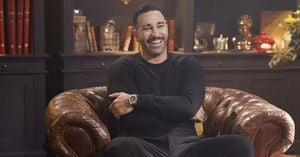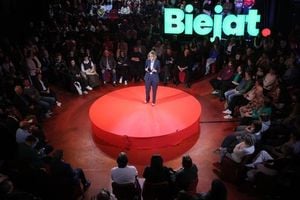As the war in Ukraine enters its 1171st day, tensions continue to escalate, particularly on the front lines where Russian forces are engaged in active combat. On May 9, 2025, while Moscow celebrated Victory Day with a grand military parade, Lviv was abuzz with discussions about establishing a tribunal for Russian President Vladimir Putin. This juxtaposition of events highlights the ongoing complexities and emotional weight surrounding the conflict.
In Moscow, the military parade commemorating the 80th anniversary of the Soviet victory over Nazi Germany was attended by over twenty foreign leaders, including Chinese President Xi Jinping and Serbian President Aleksandar Vučić. Russian President Vladimir Putin delivered a speech that notably downplayed the ongoing war in Ukraine, instead emphasizing Russia's commitment to standing against "Nazism, Russophobia, and anti-Semitism." He stated, "Russia will always remain an unbreakable barrier against Nazism." This rhetoric reflects a troubling narrative that has emerged since the beginning of the conflict, linking the historical victory of World War II to the current military actions in Ukraine.
More than 11,000 military personnel participated in the parade, showcasing an array of military hardware, including the BRM-1K reconnaissance vehicles and various drones used in the ongoing conflict. Interestingly, among the attendees were military officials suspected of involvement in war crimes against Ukrainian civilians. This troubling detail underscores the pervasive atmosphere of impunity that surrounds the Russian military's actions in Ukraine.
On the eve of the parade, Putin announced a three-day truce, but Ukraine did not officially agree to it. Reports indicated that some units of the Ukrainian Armed Forces received orders to open only retaliatory fire, while the General Staff of the Ukrainian Armed Forces reported that Russian troops continued their attacks, violating the ceasefire.
In Lviv, a significant meeting took place involving delegations from 35 EU countries, led by EU Commissioner for Foreign Affairs, Josep Borrell. During this meeting, the EU agreed to allocate an additional €1.9 billion for military support to Ukraine, which will be funded through frozen Russian assets. Prime Minister Denys Shmyhal highlighted three historical events that took place on this day: a meeting of EU foreign ministers, the signing of an agreement to funnel Russian assets to support Ukraine's defense, and discussions about establishing a special tribunal for crimes of aggression against Ukraine.
As part of this military support, €1 billion will be directed towards purchasing weapons from Ukrainian manufacturers, with further funds allocated for artillery and enhancing Ukraine’s air defense systems. The proposed tribunal, informally dubbed the "tribunal for Putin," is set to launch next week in Luxembourg, where it will investigate the actions of high-ranking Russian officials, including Putin himself. However, the EU has acknowledged the challenges in prosecuting these individuals while they retain their official positions.
Amid these developments, individual reflections on Victory Day reveal a complex emotional landscape. Evgeny, an Israeli citizen, shared memories of his father who lived through World War II. He expressed a sentiment that resonates with many: that the true essence of the victory belongs to all who fought against fascism, and that the current narrative in Russia has distorted this shared history.
In other news, U.S. President Donald Trump expressed his frustration over the stalled efforts to resolve the conflict in Ukraine, stating that it has affected his sleep. During a meeting with donors, he remarked, "We are reaching a point where some decisions must be made," indicating a growing urgency within the U.S. administration regarding the situation in Ukraine.
Meanwhile, Russian officials, including Kremlin spokesman Dmitry Peskov, have expressed hope that the U.S. can persuade Ukraine to adopt a more flexible approach in negotiations. Peskov emphasized that any ceasefire must be accompanied by a halt in Western arms supplies to Ukraine, questioning why Russia should grant Ukraine an advantage during negotiations.
European leaders have threatened new sanctions against Russia if it does not agree to a long-term ceasefire. In a joint statement, leaders from France, Germany, the UK, and Poland called for a full and verifiable 30-day ceasefire to facilitate negotiations for a just peace. However, reports indicate that the Ukrainian military has been actively violating the ceasefire, with over 5,000 violations recorded, including artillery shelling and drone strikes.
As the situation remains fluid, the international community continues to monitor developments closely. The ongoing hostilities and the potential for escalation underscore the urgent need for diplomatic solutions to the conflict. In Ukraine, the war's impact is felt deeply, with citizens reflecting on the significance of Victory Day in the context of their current struggles.
As the conflict continues, the need for dialogue and negotiation remains paramount. The juxtaposition of celebrations in Moscow and discussions of accountability in Lviv serves as a stark reminder of the complexities and challenges that lie ahead in finding a resolution to this devastating conflict.



